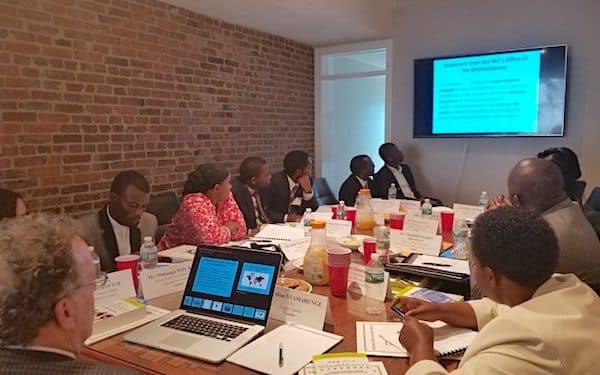The Human Rights Defenders’ 2015 Whistleblower Award recipient, David Kafulila, recently visited the National Whistleblower Center (NWC) in Washington, DC, with a group of business and government professionals from countries across Africa. NWC Executive Director and whistleblower law expert Stephen Kohn taught participants about whistleblower rights in the U.S., and best practices they could potentially adopt in their home countries—many of which are rampant with government corruption and offer little, if any, protection for whistleblowers.
Meeting attendees were participants in the U.S. State Department’s International Visitor Leadership , studying “Transparency and Accountability in Government and Business.” Kafulila, from Tanzania, received a whistleblower award after blowing the whistle on his country’s biggest corruption scandal, which involved top government officials in a $250 million dollar money laundering operation known as the “Tegeta Escrow Scandal.”
The Price of Justice
A former Member of Parliament (MP), and long-time anti-corruption activist, Kafulila was subject to retaliation from powerful enemies, and fought years for a fair investigation. He received many death threats and attempts on his life, forcing him and his family to relocate; was sued for defamation by one of the companies involved in the scandal; and lost his seat as an MP. Kafulila and his family lived in constant fear for years.
Despite immense hardship, Kafulila refused to back down. The legal case is still ongoing, but some justice has been served with a number of government officials being forced out of office, including the country’s Attorney General, Energy Minister, and Housing Minister.
Kafulila said there are many legal changes that Tanzania needs to improve transparency and address systemic corruption, including protections for whistleblowers: “We have the Whistleblower Protection Law, which was enacted following this scandal, but it doesn’t protect the whistleblower’s confidentiality… [also] unlike in USA where whistleblowers can be rewarded a percentage of the recovery assets for the high risks they take, in Tanzania we still don’t have such system, which is very important in fostering this anti-corruption culture.”
The U.S., International Whistleblowers, and the FCPA
Whistleblowers, including foreign nationals, can apply for monetary rewards when reporting bribery prohibited by the Foreign Corrupt Practices Act (FCPA), which criminalizes bribes paid to foreign government officials by publicly traded companies. U.S. jurisdiction requires there to be some element of U.S. involvement in the bribery, but what is considered as ‘involvement’ is extremely broad. Under the FCPA, foreign-national whistleblowers can submit claims “anonymously,” which is often the safest and most effective way to report government corruption in many countries. To incentivize reporting, the Securities Exchange Commission (SEC) pays whistleblowers between ten and thirty percent of the total amount recovered for providing “original information” leading to a successful enforcement action.
Whistleblower Rights are Fundamental to Fighting Corruption
After the group discussion with Kohn, Kafulila said he picked up some useful strategies to bring back to Tanzania with him: “When I am back [in] my country I will try to convince the government … and civil society on the need to institutionalize whistleblower training.”
However, Kafulila still worries about the impact of widespread whistleblower retaliation on discouraging others from speaking. “Now in my country, the great lesson young activists who aspire to do what I am doing will have from my example, is that my parliamentary seat was taken, simply for whistleblowing.”




